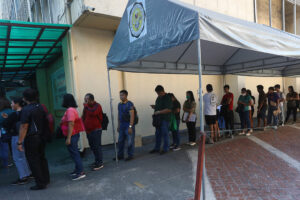THE PHILIPPINES’ monetary policy may need to be calibrated to integrate increasingly drastic supply shocks, the International Monetary Fund (IMF) said.
“Looking ahead, monetary policy may need to adjust to more frequent and severe supply-side shocks,” the IMF said in its latest Staff Report for the 2024 Article IV Consultation.
“Inflation dynamics in the Philippines have been characterized by a stronger influence of supply factors over demand factors in recent years, in part reflecting the Philippines’ high reliance on imports of fuel and food, limited use of price controls, and exposure to adverse climate events.”
The IMF said the “frequency, severity, and persistence” of severe supply shocks may rise in the future due to climate change and rising geoeconomic fragmentation.
The Philippines has been the most at-risk country globally for 16 straight years, according to the latest edition of the World Risk Index.
The country is typically hit by several storms and other extreme weather events throughout the year, which causes billions of pesos worth of agricultural and infrastructure damage.
“The BSP (Bangko Sentral ng Pilipinas) will need to be careful in ‘looking through’ them to ensure second-round effects do not lead to a de-anchoring of inflation expectation,” the IMF said.
Inflation has soared since 2022 due to a spike in global commodity prices and supply-chain disruptions. Philippine annual inflation averaged 5.8% in 2022 and 6% in 2023.
FOREX INTERVENTION?The IMF said that the foreign exchange rate could act as a “shock absorber,” while foreign exchange intervention (FXI) could be appropriate under certain circumstances.
“Shifting expectations regarding future policy rates in the US have raised peso volatility. The BSP has been appropriately focusing on domestic price stability, allowing the exchange rate to play its role as a shock absorber, and should continue to do so,” it added.
So far this year, the peso has sunk to the P59-per-dollar level thrice. The BSP has said it is watching the peso closely and has been a bit more active than usual in the markets.
“Given the Philippines’ shallow FX markets — the most relevant IPF (Integrated Policy Framework) friction — and the nonlinear impact of exchange rate fluctuations on inflation expectations, FXI can play a role in mitigating risks associated with abrupt exchange rate movements.”
“Nevertheless, deployment of FXI should only be temporary and not a substitute for warranted macroeconomic policy adjustments.”
The BSP has said it only intervenes to curb speculation and keep markets orderly.
“Going forward, in considering the optimal response to periods of stress and elevated uncovered interest rate parity premia, the BSP should remain cognizant of tradeoffs between using FXI and domestic foreign exchange market deepening.”
Meanwhile, the IMF also said it will be crucial to “ensure coordination across different parts of the BSP’s toolkit.”
“While total holdings have declined, the BSP retains a substantial portfolio of government securities acquired as part of the COVID-19 response. It has allowed the BSP to move to a variable-rate/variable-amount reverse repurchase (RRP) framework, where the target RRP rate is the policy rate.”
“Going forward, the BSP could usefully communicate a strategy for the size of its balance sheet in normal times… to provide more certainty to market participants.”
It cited the central bank’s recent move to lower the reserve requirements, saying it will lead to a welcome decline in financial intermediation costs and better align reserve requirements with regional peers.
“Changes in the reserve requirement ratio (RRR) need to be factored into the overall monetary policy stance and coordinated with any changes in the size of the BSP balance sheet,” the IMF said.
Starting October this year, the BSP reduced the RRR for universal and commercial banks and nonbank financial institutions with quasi-banking functions by 250 basis points to 7% from 9.5%.
The IMF also noted the move to reactivate the interest rate swap (IRS) market and establishing a benchmark yield curve to “further develop the Philippines’ fixed income and money markets and improve monetary policy transmission.”
“The authorities’ recent initiative to create an enhanced peso IRS market based on the RRP will help businesses and banks hedge local interest rate risk.”
Last month, the central bank launched the peso IRS market, following the release of the updated International Swaps and Derivatives Association. This is part of its efforts to deepen the capital markets.
“The fragmentation of the yield curve at the short end with yields on government securities well below those on BSP bills remains an obstacle for accurate valuation of working capital that also hampers the development of the IRS and derivatives markets,” the IMF said.
“Coordinated efforts by both the Bureau of the Treasury (e.g., by increasing issuance at maturities below 365 days) and the BSP (e.g., by further expanding access to nonbanks and ensuring that BSP bills can be used as collateral) are essential to address yield curve fragmentation and improve monetary policy transmission.” — Luisa Maria Jacinta C. Jocson


















